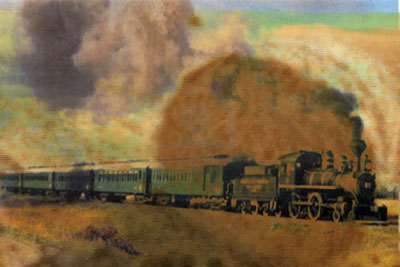
(for Paul “Wolf” Larsen)
Born in a town where dogs were mongrels
milk cows were skinny-uddered slaughter-house
cattle, and farmers scratched out survival
on gully-rigged farms best-suited for cattle grass,
Coyotes, Russian Thistle and Prairie Dogs,
farms where I stacked bales in haymows
of airless barns, town where at Sunday Church
I sat beside auburn-haired Shirley Franzen with skin
so white and lips so red, I gave myself frequently
to the Jesus of her fevered faith, even though I believed
mostly in my father’s faith in his own two hands.
At sixteen I believed in football, girls and
people as true to habit as to love itself,
all of us fed by the purity of artesian water
pouring into the “Big Sandy River,” spring water
filling the blackened Steam Engines of Union Pacific
Freight trains, smoke stacks billowing great white
clouds of expectation out into blank blue skies running
high over grazing cattle, smooth-hipped horses
standing close, nickering into a vast prairie silence.
Sometimes I’d put my ear to the rail
trying to hear before I could see a train…
sometimes I’d balance walk a rail all the way
to the curve round Busing’s pasture —
a quarter mile without stepping off — “Big Sandy River”
on one side of me and Levi Landkammar’s haystacks
on the other, as though innocence was earned
in that place where perseverance smoothed
the imperatives of everyday existence —
protection from darkness within and without.


Another poem from Larson that fills the mind with grand images.
Larsen,
You write of a time and place that’s long ago and far from here. But you coax memory into remembering and nudge expectations toward reality.
Dave
Lovely. And although the images may be from some past remembered . . . they are beautifully present — as there is no distance or time in Spirit. Between the river and the hay fields is where we listen for the signs of the other world.
This poem is a lovely oasis in the midst of today’s world.
Although even readers not raised decades past in the rural America of vast prairies and even vaster skies will relate to the haunting images of innocence enforced by isolation, to those of us who lived that life, Larsen’s poem percolates memories from the bedrock of our beings with the same “purity of artesian water pouring into the Big Sandy River.” Those of us driven to “walk the rail” had little choice in the leaving, but that pasture of protection left behind in our distant pasts remains with us nestled undisturbed between the river and the haystacks shimmering in the sunshine of afternoon innocence and wistfulness.
Thank you Larsen.
So, once again, you bring to us the images of days gone by and yet still with us; of innocence and promise; of a wink and a smile; and of the rumblings that herald the time yet to come – full of promise and redemption.
What a couple! The beautiful scenes that Larsen’s words create are no less vivid than those from Jeanette’s colorful pallet. What a team!
Larsen, Thank you for sharing your gift with words, once again you have taken me back to a place I once knew. I’m going to share this with a railroad man who loves poetry and will appreciate your thoughts.
Larsen, beautiful. I was brought up in that time period and worked on farms not my own or my father’s. He bot and sold cattle taken from those pastures, too old to give milk. Some of the parts that you did not mention that took me quickly out of the “innocence’ that you so excitingly potray you stop short of “going there” to the bloody, dirty slaughter houses that I was introduced to at age 10. I never eat pig of any nature because I seen how the die and they know that it is happening. You inspired me to put some of these thoughts to print and write as how the world turned me away from innocence in that slaughter house and out into the slaughtering that took place in my life in the South Pacific at age 18, Keep writing please only piople like you are going to save me from the PTSD that I’m told that I have since age 18 or was it really age 10 in that stinking slaughter house. My father told me that I would have to grow up to the realities of life but he put his hand on my shoulder to stop me from growing too fast. I felt the hand for eight years and then I was there.